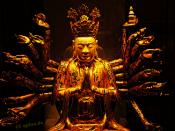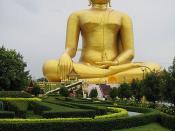Buddhism
Buddhism seems to be more of a philosophy, rather than a religion. It is based on the Buddha's own observation of the way things are, instead of metaphysical speculation of first causes, theology, and worship of deity or deification of the Buddha. The goal of the Buddhist is to live a life of peace, loving, kindness, and wisdom. Attaining Nirvana is also another major goal of Buddhism.
Siddhartha Gautama founded Buddhism, in Northern India around 535 BCE. Because he is the founder, he attained the title Lord Buddha, which means "one who has awakened". This new religion continued to expand across Asia and developed two main forms, Theravada Buddhism and Mahayana Buddhism. Theravada Buddhism is sometimes called Southern Buddhism. It is dominant in Southeast Asia, Thailand, Cambodia, and Laos. Mahayana Buddhism is often called Northern Buddhism. This form is found largely in Japan, China, Korea, Tibet, and Mongolia. Tibet later became isolated and formed it's own Buddhism called Tibetan.
In the 19th Century a new Buddhism emerged as a truly international movement to produce a single form of Buddhism, it was called Modern Buddhism.
Sidhartha Gautama was a member of the Sakyas clan, and is sometimes referred to as Sakyamuni, which means "the sage of the Sakyas". Sakyamuni was raised as a Hindu, and thought to succeed his father later in life. This however, is not what happened. Skyamuni married Yasodhara when he was 16. They later had a child named Rahula. Shortly after his sons birth Sakyamuni either went on four trips by chariot, or had four visions. He saw elderly people suffering, and people grieving their loved ones. These sights cause him to reflect deeply upon suffering brought about by old age, illness, and death. On the fourth trip Sakyamuni saw a religious medicant who led...


